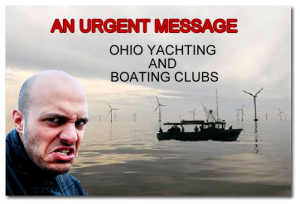JAN 29, 2019https://www.tradeonlytoday.com/columns-blogs/ohioans-cheer-new-jerseys-turbine-decision

CLICK ON THIS LINK TO FIND MORE INFORMATION ON HOW TO SAVE LAKE ERIE FROM INDUSTRIAL WIND: Lake Erie Marine Trades Association, Norm Schultz
Boating and environmental groups in Ohio and Michigan are cheering the New Jersey Public Utilities Commission’s decision to reject the proposed Nautilus wind farm off the Garden State, declaring that it “fails to demonstrate a net economic benefit to the state.”
Organizations in Ohio and Michigan are engaged in a battle to prevent wind turbines from being built in America’s five Great Lakes. “This basis for the rejection by New Jersey’s PUCO mirrors our position that the proposed turbine farm in Lake Erie off Cleveland, called Icebreaker, will also fail to provide a net benefit,” said Michelle Burke, executive director of the Boating Associations of Ohio.
In Ohio, an application to install wind turbines in Lake Erie is before the Ohio Power Siting Board. If permitted, these would be the first turbines ever built in fresh water, and the Great Lakes hold 20 percent of the world’s fresh water. A possible decision by OPSB last November was postponed but could be reviewed at a pending meeting Feb. 21.
Opposition to Icebreaker and any such project in the Great Lakes has been building since it was revealed that the intention of Icebreaker is to trigger construction of up to 1,200 additional industrial-size windmills in the Great Lakes. “But the claimed benefits for consumers of Icebreaker are misleading and cannot be substantiated,” said John C. Lipaj, a board member of the Lake Erie Foundation. “The diligence by the New Jersey PUCO can be an important precedent in the Icebreaker case before the OPSB.”
The New Jersey PUCO stated: “The petitioner’s overestimation of net economic benefits and lack of data to validate its estimates, creates a scenario where rate-payers carry a disproportionate amount of the investment risk.”
Michigan is the only state that borders four of the five Great Lakes, including a large portion of Lake Erie.
“MBIA is not against alternative energy,” said Nicki Polan, executive director of the Michigan Boating Industries Association. “However, wind farms in our Great Lakes give rise to legitimate concerns for the health and aesthetics of these unique bodies of water. The risks are too high, the rewards not evident, so we support the groups in Ohio opposing plans like Icebreaker.”
The environmental impact is drawing the loudest outcry. The lakes provide drinking water for millions of people. Oils and chemicals in the turbine gearboxes have failed and illegally released pollutants into the water. Each turbine will contain 404 gallons of industrial lubricant. In addition, wind turbines have exploded and burned, causing pollution (search YouTube for video).
In addition, the turbines kill bats and protected birds, including bald and golden eagles. Lake Erie is a major flyway for birds, and building turbines will violate the Migratory Bird Treaty. Moreover, the Icebreaker applicant has claimed the National Audubon Society supports the project. It does not.
Then there is the damage to the natural beauty of the Great Lakes. The lakes already face serious algae problems, myriad invasive species and other threats. The lakes provide drinking water for millions of people in eight surrounding states. They attract billions of dollars in tourism and recreational pursuits annually, including boating and fishing. No one wants to see hundreds of 400-foot spinning turbines ruin the splendor of these waters.
Add it up: No net economic benefits. Environmental damages. Growing public opposition. A variety of likely legal actions. The Great Lakes are held in the public trust by each bordering state and Canada. Accordingly, any proposal that will pollute and endanger the lakes should be wholly rejected by the agencies charged with protecting them, in this case the OPSB.
BY




